We all know that physical maladies can affect our sleep — tossing and turning due to congestion, or lying awake due to heartburn are all too common. But mental conditions are linked to our sleeping patterns, too. One super common issue that can affect sleep is depression.
“There’s still a stigma around depression, even though an estimated 21 million American adults experienced at least one depressive episode in 2021 alone,” says Dr. Kristen Casey. Depression is certainly nothing to be ashamed about, as it’s a health problem like any other. And if you have a condition like depression that is affecting your sleep, you should definitely seek out treatment to help you get well again.
This piece will cover common types of depression, symptoms to look out for and treatment options. It will also delve into the ways that depression can affect your sleep, and offer some potentially helpful habits and lifestyle changes. Finally, it will offer further resources. If you think you are suffering from depression, seek help from a medical professional as soon as possible.
What Is Depression?
 Depression is also called clinical depression or major depressive disorder. It’s a mood disorder that can affect how you feel, think and act.
Depression is also called clinical depression or major depressive disorder. It’s a mood disorder that can affect how you feel, think and act.
According to the Mayo Clinic, depression causes “a persistent feeling of sadness and loss of interest.” And it can affect many different facets of your life — including your relationships, work, appetite and sleep habits.
Despite how common depression is in America, the cultural stigma surrounding mental health issues can make it difficult for people to seek help.
Are There Different Types Of Depression?
While clinical depression is the most widely known form of the condition, there are a number of depressive disorders. Some forms of depression are linked to a certain event, such as giving birth, or seasonal changes like the arrival of winter. Here are some of the mental health issues that fall under the catchall category of “depression”:
Persistent depressive disorder
“Also called dysthymia, this condition lasts longer than your typical case of clinical depression, although it may be less severe,” says Casey. “While major depression often occurs in episodes, persistent depressive disorder is defined as more constant, lasting for years,” Harvard Health explains.
Doctors diagnose persistent depressive disorder if someone has been experiencing the symptoms of depression for two years or longer.
Postpartum depression (PPD)
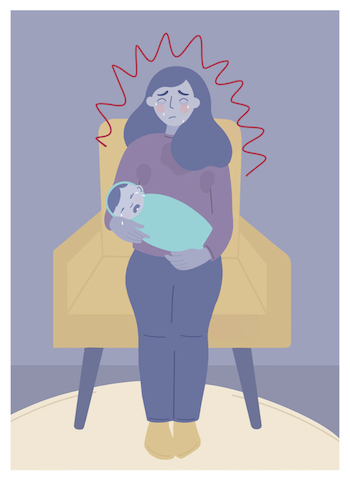 PPD affects around one in seven new moms in the U.S., according to the National Institutes of Health (NIH). This mood disorder can develop within days, weeks or months of giving birth, and symptoms last for at least two weeks.
PPD affects around one in seven new moms in the U.S., according to the National Institutes of Health (NIH). This mood disorder can develop within days, weeks or months of giving birth, and symptoms last for at least two weeks.
“Common PPD symptoms may include depressed mood, excessive worrying or anxiety, trouble with concentration and memory, issues making decisions, not showing enough concern for the baby, showing too much concern for the baby and crying frequently,” says Casey.
As the NIH points out, many of these symptoms are common or even expected in new parents, which can make it difficult to ascertain when someone is suffering from PPD versus just experiencing the “baby blues” or adjusting to the major change of welcoming a new infant. “Distinguishing the baby blues from more serious conditions such as postpartum depression and postpartum psychosis can be difficult for new moms and their families, so recognizing the signs early and contacting a health care provider is key to effective treatment,” Georgetown advises.
Seasonal affective disorder (SAD)
SAD affects around 5% of adults, the American Psychiatric Association estimates. This form of depression is triggered by seasonal changes and is most common during the fall and winter months when there is less sunlight. “SAD has been linked to a biochemical imbalance in the brain prompted by shorter daylight hours and less sunlight in winter,” the association explains.
Symptoms of SAD include low energy levels, trouble sleeping, oversleeping, feeling depressed for most of the day almost every day, appetite or weight changes, feeling hopeless or lost and having difficulty concentrating.
“The reduced level of sunlight in fall and winter may cause winter-onset SAD,” the Mayo Clinic website explains. “This decrease in sunlight may disrupt your body’s internal clock and lead to feelings of depression.”
There are a number of treatments for SAD, depending on the individual’s needs and how severe the issue is. Antidepressant medication, counseling, vitamin D supplements and light therapy are common treatment tools.
Premenstrual dysphoric disorder (PMDD)
PMDD causes severe anxiety, depression or irritability for one or two weeks before the start of a menstrual period. It has debilitating effects for up to 8% of women of childbearing age, and experts aren’t exactly sure what causes it. The Office on Women’s Health says that hormonal changes may play a role.
Finally, some forms of bipolar disorder involve depressive episodes. For instance, people with bipolar II disorder have alternating hypomanic and depressive episodes. The Stanford Medicine Bipolar Disorders Clinic defines a hypomanic episode as “a distinct period of persistently elevated, expansive or irritable mood, lasting throughout at least 4 days, that is clearly different from the usual nondepressed mood.”
What Are Some Symptoms Of Depression?
According to the Anxiety and Depression Association of America (ADAA), there are a number of symptoms that may characterize a major depressive episode:

- Persistently feeling anxious, “empty,” or sad
- Feeling pessimistic, hopeless, worthless, helpless or guilty
- Losing interest in hobbies and activities you typically enjoy
- Fatigue
- Struggling to concentrate, remember things and make decisions
- Low appetite leading to weight loss
- Overeating leading to weight gain
- Insomnia
- Oversleeping
- Waking up extremely early in the morning
- Suicidal thoughts
- Persistent symptoms of pain that don’t respond to treatment
What Are Some Potential Causes Of Depression?
Some types of depression, such as seasonal affective disorder or postpartum depression, are triggered by specific events. But researchers don’t know exactly what causes depression, or how to prevent people from developing depression in the first place.
That said, here are some theories about what could contribute to depression.
There may be a genetic component involved.
“People who have a first-degree relative (for example, a parent or sibling) with depression appear to have a two to three times greater risk of developing the condition than the general public,” the National Institutes for Health explains. “However, many people who develop depression do not have a family history of the disorder, and many people with an affected relative never develop the disorder.”
Chronic stress might contribute to depression.
According to the Mayo Clinic: “Chronic stressful life situations can increase the risk of developing depression if you aren’t coping with the stress well. There’s also increasing evidence of links among poor coping, stress and physical illness.”
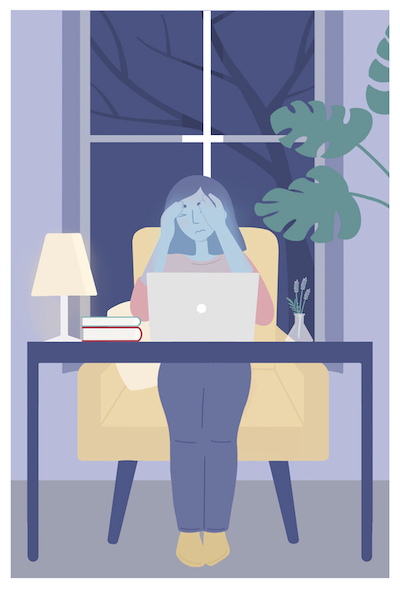
If you feel constantly stressed, the clinic recommends finding ways to mitigate that stress to avoid ill effects on your health. You can try yoga or meditation, working out regularly, prioritizing your sleep and making sure you have the time to do things you enjoy. “Although these strategies may help for certain types of stress, it’s important to contact your healthcare provider to discuss different treatment options if your stress is unmanageable,” says Casey.
Hormones may play a role in conditions like postpartum depression (PPD) and premenstrual dysphoric disorder (PMDD).
According to the National Institute of Mental Health, “dramatic physical and hormonal changes” associated with pregnancy, menstruation and menopause can put some people at an increased risk for developing depression.
Some research connects poor nutrition to mental health issues.
Diet can have a large impact on the prevention of depression, according to recent research published by MDPI. “Balanced dietary patterns such as the Mediterranean diet and certain foods such as fish, fresh vegetables and fruits have been associated with a lower risk of depression or depressive symptoms, while high-fat Western diets and sugar-sweetened beverages have been associated with higher risk of depression or depressive symptoms,” the researchers wrote.
How Does Depression Affect Sleep?
Depression can affect sleep in a few different ways, which may vary depending on what type of depression you have and what symptoms you are experiencing. For example:
Some people with depression also struggle with insomnia.
 The link between insomnia and depression isn’t totally clear — does depression cause insomnia, or does insomnia play a role in the development of depression? Psychological research has long held that depression may lead to diminished sleep quality. Meanwhile, sleep research suggests low-quality sleep may provoke or exacerbate depression.
The link between insomnia and depression isn’t totally clear — does depression cause insomnia, or does insomnia play a role in the development of depression? Psychological research has long held that depression may lead to diminished sleep quality. Meanwhile, sleep research suggests low-quality sleep may provoke or exacerbate depression.
A recent study, which was published in JAMA Psychology, suggests that poor sleep quality and depression may share certain neural connections within the brain.
“We found that brain areas with connectivity related to sleep quality also had correlations with depression,” study co-author Dr. Edmund Rolls, professor of computer science at the University of Warwick in Coventry, England, told Mattress Clarity via email.
In addition to suggesting that poor sleep quality may cause depression, Rolls says the research also suggests the relationship may go both ways. “Some effects were found both ways round, though the effects in the direction that depression causes poor sleep quality were less strong,” he says.
Harvard Health says, “Studies in both adults and children suggest that sleep problems may raise the risk for, and even directly contribute to, the development of some psychiatric disorders. This research has a clinical application, because treating a sleep disorder may also help alleviate symptoms of a co-occurring mental health problem.”
Other times, people with depression will experience fatigue or excessive daytime sleepiness. One potential symptom of depression is oversleeping.
As Psychology Today explains, “sleeping too much is linked with many of the same health risks as sleeping too little, including heart disease, metabolic problems such as diabetes and obesity and cognitive issues including difficulty with memory.”
What Happens When Depression Interferes With Sleep?
Experts believe that sleep issues can make depression worse.
“Although scientists are still trying to tease apart all the mechanisms, they’ve discovered that sleep disruption — which affects levels of neurotransmitters and stress hormones, among other things — wreaks havoc in the brain, impairing thinking and emotional regulation,” Harvard Health says. “In this way, insomnia may amplify the effects of psychiatric disorders and vice versa.”
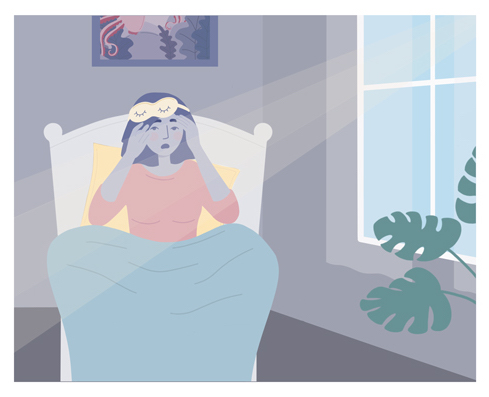
Another consideration: Some symptoms of depression may contribute to sleep deprivation. According to the American Academy of Sleep Medicine (AASM), most adults need between 7 and 9 hours of sleep each night. People who consistently do not get that amount of sleep may be sleep deprived.
Sleep deprivation can affect:
- Mood. Sleep deprivation may be linked to symptoms of depression, as well as anxiety and feeling irritable.
- Behavior. People who are sleep deprived may struggle to pay attention or remember things and may feel distracted. Sleep deprivation is linked to longer reaction times, making more mistakes and lapses in judgment — all of which can be particularly dangerous while driving or in many workplace environments.
- Health. Being sleep deprived may be linked to diabetes, obesity, heart disease and high blood pressure.
Can Sleeping Well Help Relieve Depression?
While getting enough sleep is not specifically a cure for depression, lifestyle changes that promote sleep may help alleviate depression when combined with medication, therapy or both. For example, if someone’s depression is linked to a stressful work schedule that prevents them from sleeping, changing their work schedule to allow for more sleep may decrease their stress and help mitigate the symptoms of depression.
According to Hopkins Medicine, depression and sleep problems go hand-in-hand. “People with insomnia , for example, may have a tenfold higher risk of developing depression than people who get a good night’s sleep. And among people with depression, 75 percent have trouble falling asleep or staying asleep,” Hopkins notes.
How To Get Better Sleep Even With Depression
If you are suffering from depression, you might feel a lack of motivation to take care of yourself. But paying attention to your own health and needs is an important part of recovery. To that end, doing your best to make sure you get enough sleep can be very beneficial to your health.
You can chat with your doctor to see how much sleep they recommend each night, but generally, adults should aim for seven to nine hours each night.
Sleep hygiene, a set of habits that promote regular, high-quality sleep, can be helpful. Some sound sleep hygiene recommendations include:
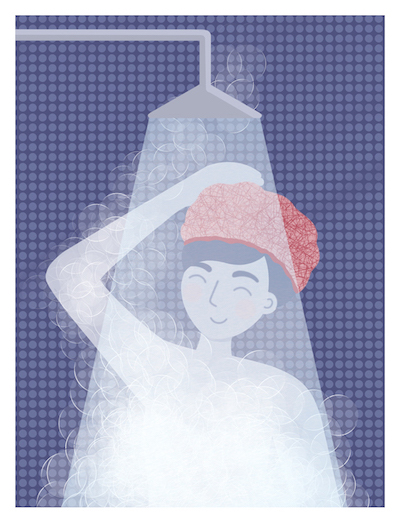
- Waking up at the same time each morning, and going to bed at the same time each night, even on the weekends
- Taking some time to “wind-down” before bed with a dedicated, relaxing bedtime routine. This can include listening to music, reading a book, meditating, taking a warm shower or drinking a cup of non-caffeinated herbal tea
- Cutting out caffeine at least eight hours prior to bedtime
- Avoiding heavy meals and alcohol close to your bedtime
- Staying away from electronic screens for at least an hour before bed. Screens give off blue light, which can interfere with how the body releases melatonin, a hormone that helps cue when it’s time to go to sleep
- Keeping your bedroom cool, dark and quiet. You can use fans, earplugs, white noise, blackout curtains and eye masks to counteract any street noise and lights that could interrupt your sleep
It’s also important to mention any sleep-related symptoms or issues to your doctor when you are discussing how best to treat your depression. Your doctor can then take your sleep problems into account when prescribing any medications, as certain meds can have sleep-related side effects such as causing fatigue or contributing to insomnia.
How To Soothe Depression So You Can Sleep Better
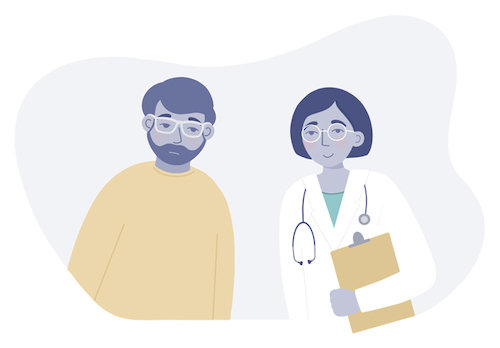 If you think you have depression, you should speak with a doctor or mental health professional as soon as possible. A provider can diagnose you and work with you to find the best treatment.
If you think you have depression, you should speak with a doctor or mental health professional as soon as possible. A provider can diagnose you and work with you to find the best treatment.
Common treatment recommendations include medication, therapy and lifestyle changes. The right treatment for you depends on your symptoms and lifestyle habits.
Medication For Depression
*Please note, information regarding medication has not currently been verified by our Expert Network.
Your doctor may prescribe medication to treat depression. Common antidepressant medicines may include:
- Selective serotonin reuptake inhibitors (SSRIs) like Celexa, Paxil, Prozac, Lexapro and Zoloft. Serotonin is a neurotransmitter that carries signals between brain cells, and it’s been correlated with mood regulation. SSRIs basically work by blocking the reabsorption of serotonin in the brain, which makes more serotonin available.
- Serotonin and norepinephrine reuptake inhibitors (SNRIs) like Cymbalta, Effexor XR, Fetzima and Pristiq. SNRIs block the reabsorption of serotonin, just like SSRIs, but they also block the reabsorption of a second neurotransmitter called norepinephrine.
Your doctor will determine which medication and dosage are best for your particular symptoms, then prescribe generic or brand-name pills.
If you are prescribed antidepressants, the University of Rochester Medical Center recommends chatting with your healthcare provider about:
- Any side effects the medications could cause
- Potential interactions with other medications that you’re taking
- Whether or not you can consume alcohol while taking the medicine
- How long it might take for you to see an improvement in your depression symptoms
The website estimates that it can take two to eight weeks before you see a noticeable difference and stresses that you should not stop taking the pills abruptly or without your doctor’s approval. Furthermore, you should contact your doctor immediately if you experience suicidal thoughts, vomiting that won’t stop, extreme anxiety or trouble passing urine.
Psychotherapy For Depression
Another treatment option that can be combined with medication or tried as a standalone treatment is psychotherapy. Cognitive Behavioral Therapy (CBT) is one example of an effective evidence-based therapeutic approach. It involves working to identify unhelpful thinking patterns and change them, and is commonly used to treat depression, anxiety, PTSD and more.
“CBT helps you become aware of inaccurate or negative thinking so you can view challenging situations more clearly and respond to them in a more effective way,” the Mayo Clinic explains.
CBT may not be right for everyone, though. “There are other evidence-based psychotherapies that may be helpful, such as Acceptance and Commitment Therapy (ACT). All of this is decided by your therapist depending on your symptoms and their severity,” says Casey.
“There has been a push to move towards evidence-based treatments (EBTs) to treat depression. EBTs are treatments that have been researched over time, and have shown their effectiveness through rigorous research trials, such as randomized controlled trials (RTCs).
That being said, there are several evidence-based treatments that have been established for depression, including CBT, Interpersonal Therapy for Depression and more,” says Casey.
Lifestyle And Depression
 A number of lifestyle habits may assist in the management of depression.
A number of lifestyle habits may assist in the management of depression.
Regular exercise may help treat depression.
“Low-intensity exercise sustained over time…spurs the release of proteins called neurotrophic or growth factors, which cause nerve cells to grow and make new connections,” Harvard Health explains. “The improvement in brain function makes you feel better.”
However, the website stresses that this only works if you commit to long-term exercise over weeks or months, rather than working out just once and expecting to feel better right away. For this reason, it’s best to find a type of exercise you enjoy and will continue doing (and that is appropriate to your fitness level). That could mean hiking, swimming, yoga, team sports like softball, lifting weights, running, tennis or brisk walking with a friend or your dog. Discuss exercise with your doctor or physical therapist to find out what’s right for you.
To be clear: Exercise alone cannot cure depression, but doctors often recommend it alongside medication, therapy or both. Plus, a regular exercise routine can help ease insomnia and other sleep problems.
Changing your diet may be a helpful part of treatment for depression.
“Serotonin is a neurotransmitter that helps regulate sleep and appetite, mediate moods and inhibit pain. Since about 95% of your serotonin is produced in your gastrointestinal tract, and your gastrointestinal tract is lined with a hundred million nerve cells, or neurons, it makes sense that the inner workings of your digestive system don’t just help you digest food, but also guide your emotions,” Harvard Health explains.
Diets packed with whole grains, fish, whole fruits and vegetables, probiotic foods and lean meats—low in sugar, refined carbs and red meat—may be correlated to improved mental health. Plus, a diet low in sugar may improve your sleep.
When To Talk To Your Doctor About Depression And Sleep
If you are experiencing the symptoms of depression, speak to your doctor or mental health professional. Be sure to mention any symptoms associated with sleep, so your doctor has the full picture of what you are experiencing and can use that information to come up with the best course of treatment. Your doctor can also evaluate you for other sleep disorders, such as sleep apnea, which can be tied to mental health conditions. They may also refer you to a specialist for a sleep study.
The Bottom Line
Depression, a common mood disorder affecting millions of Americans, can make you feel sad, anxious and uninterested in things you previously loved. Other symptoms include a lack of appetite, issues with concentration, trouble sleeping or sleeping too much.
There are a few different types of depression, including clinical depression, postpartum depression, seasonal affective disorder and premenstrual dysphoric disorder.
The most effective treatment for depression depends on your symptoms. Doctors may prescribe medication, therapy, lifestyle changes or a combination thereof.
Depression can affect your sleep in a number of ways. Some people with depression experience insomnia, while others find they are oversleeping. A common symptom of depression is fatigue.
Be sure to mention any sleep issues to your doctor, so you can factor those problems into the best treatment for your condition. And don’t be discouraged — there are many potential treatments for depression, backed by extensive research, as well as support groups for people suffering from the condition. The important thing is to know that you’re not alone and to reach out for help so you can start feeling better as soon as possible.
Further Resources
- Depression Support – Mental Health America
- Support – Depression – NAMI: National Alliance on Mental Illness
- Online Resources – Anxiety and Depression Association of America
- Suicide and Crisis Lifeline
Featured image: TheVisualsYouNeed/Shutterstock

